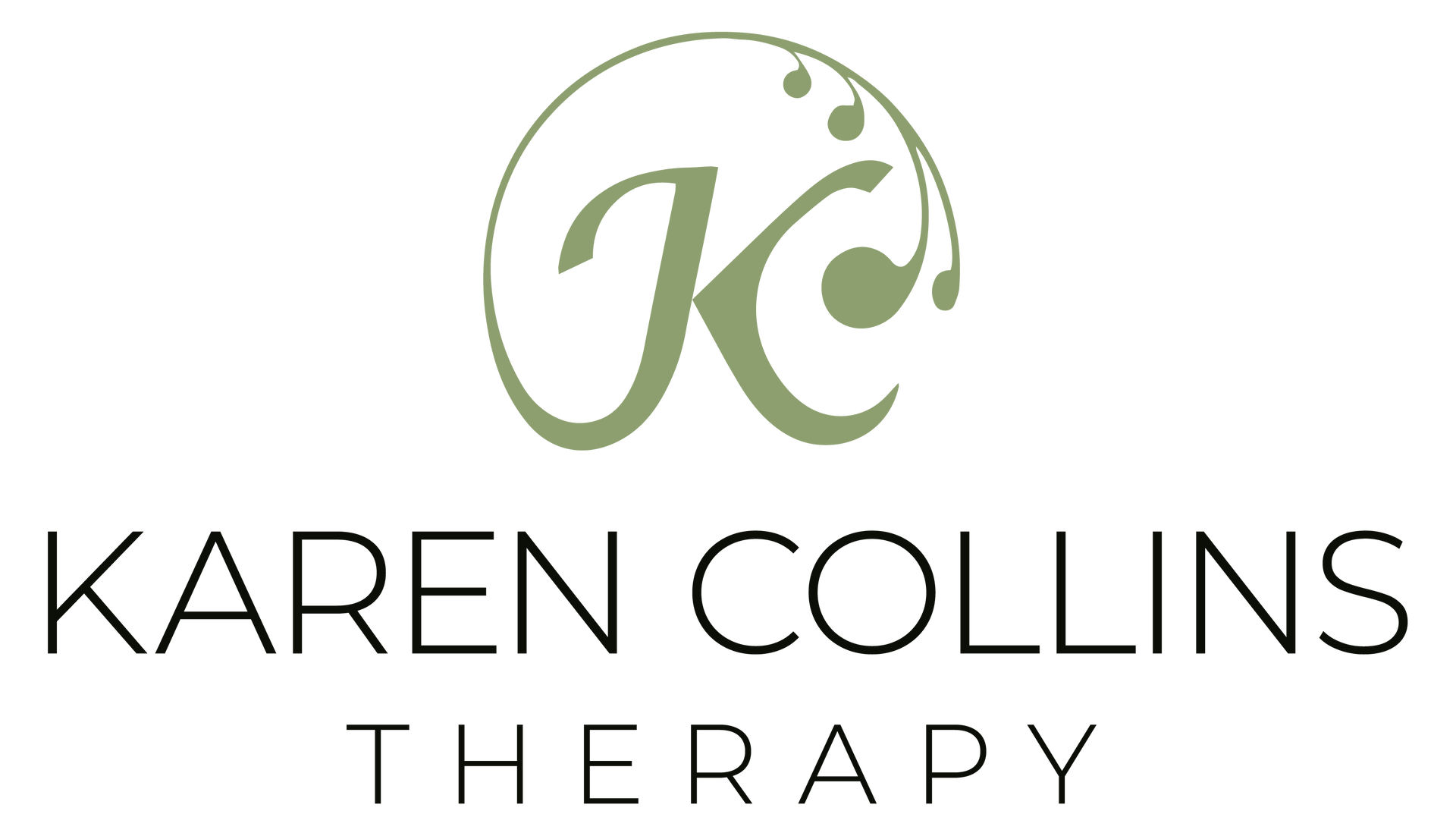Healing from Narcissistic Parents: Therapy and Support in Petaluma, California
Growing up with a narcissistic parent can leave invisible wounds that follow you into adulthood. If you've spent years questioning whether your feelings were valid, struggling with self-doubt, or finding it hard to trust others in your relationships, you're not alone.
Many adults in Petaluma and throughout Sonoma County are discovering that their childhood experiences with a narcissistic mother or father have shaped their emotional well-being in ways they're only now beginning to understand.
I'm Karen Collins, a licensed marriage and family therapist in Petaluma, and I want you to know something important: healing from narcissistic parents is absolutely possible. I know this not just as a therapist with over 20 years of experience, but as someone who has walked this path myself. I'm an adult child of a narcissistic parent, and I've done the deep work of learning to reparent myself. That personal journey, combined with my professional training in attachment therapy and trauma-informed care, allows me to offer a unique perspective and genuine understanding to clients navigating this difficult healing process.
If you're reading this, you've likely already taken the brave first step of recognizing that something wasn't quite right in your childhood. Perhaps you're dealing with anxiety and depression, struggling with codependency in your relationships, or simply feeling exhausted from trying to earn approval that never seems to come. Therapy can help you process these experiences, set healthy boundaries, and build the self-esteem that narcissistic abuse may have taken from you.
ARTICLE OUTLINE
In this guide, I'll walk you through what narcissistic parent therapy looks like, how to recognize the signs you were raised by a narcissist, and the path toward healing. We'll explore common challenges like setting boundaries with narcissistic parents, dealing with gaslighting and emotional abuse, and learning to trust yourself again. You'll also discover practical steps for reparenting yourself and building the healthy relationships you deserve. Most importantly, you'll find hope that change is possible.
What Does It Mean to Have a Narcissistic Parent?
A narcissistic parent is someone who displays patterns of self-centeredness, lacks empathy for their children's feelings, and often uses manipulation or emotional abuse to maintain control. While narcissistic personality disorder is a clinical diagnosis, you don't need a formal diagnosis to recognize narcissistic abuse in your family of origin.
Common traits of narcissistic parents include excessive criticism, an inability to celebrate your achievements without making it about themselves, emotional unavailability when you need support, and gaslighting, making you question your own reality and perceptions. These parents may have appeared perfect to the outside world while being harsh and controlling behind closed doors.
As a therapist in Petaluma who works extensively with adult children of narcissistic parents, I've seen how these patterns create lasting impacts. You might have grown up feeling like you were never quite good enough, walking on eggshells to avoid triggering your parent's anger, or taking responsibility for their emotional well-being at the expense of your own needs.
How Narcissistic Parents Affect Adult Children
The effects of growing up with a narcissistic mother or father don't simply disappear when you become an adult. Many of my clients in Petaluma come to therapy struggling with issues they don't initially connect to their childhood experiences.
Adult children of narcissistic parents often deal with chronic self-doubt and low self-esteem. When you spent your formative years receiving the message that you weren't good enough, it becomes internalized. You might find yourself constantly seeking external validation, struggling to trust your own judgment, or experiencing perfectionism, believing that if you just achieve enough, you'll finally be worthy of love.
Relationship issues are incredibly common. You may struggle with codependency, either becoming overly focused on others' needs or finding it difficult to let people get close to you. Trust issues can make vulnerability feel terrifying. Some adult children of narcissists repeat patterns they learned, unconsciously choosing partners who are emotionally unavailable or controlling.
Anxiety and depression frequently develop as a result of childhood emotional abuse. The hypervigilance required to navigate a narcissistic parent's moods often continues into adulthood, leaving you in a constant state of stress. You might also experience guilt and shame around setting boundaries or putting your own needs first.
Signs You Might Benefit from Narcissistic Parent Therapy
Recognizing that you need support is a crucial step. You might benefit from therapy if you find yourself constantly questioning whether you're "making too big a deal" out of your childhood, feeling guilty when you set boundaries with your parent, or struggling with self-criticism that sounds like your parent's voice in your head.
Other signs include difficulty in your current relationships, patterns of people-pleasing at your own expense, feeling responsible for others' emotions, or experiencing loss of trust in your own perceptions. If you grew up feeling invisible unless you were performing or achieving, or if you find yourself drawn to relationships where you have to work hard for approval, these patterns often trace back to narcissistic parenting.
Many adults in Petaluma seek therapy when they realize their childhood experiences are affecting their ability to be present in their own lives and relationships. Psychotherapy provides a safe and supportive environment to explore these connections and develop healthier patterns.
What Happens in Therapy for Adult Children of Narcissistic Parents
When you begin therapy with me in Petaluma, we start by creating a safe space where your experiences are validated. Unlike your relationship with your narcissistic parent, the therapeutic relationship is built on genuine empathy, clear boundaries, and consistent support.
We'll use attachment-focused therapy to understand how your early relationships shaped your current patterns. Attachment therapy helps you recognize that your difficulties with trust, intimacy, or emotional regulation aren't flaws in who you are, they're adaptive responses to growing up in an environment that wasn't emotionally safe.
The work involves several key elements. First, we'll help you recognize and name what happened. Many adult children of narcissists struggle to call their experiences "abuse" because it wasn't physical. But emotional abuse and narcissistic abuse are real and harmful. Naming it reduces its power.
We'll also work on reparenting yourself, learning to provide for your own emotional needs in the ways your narcissistic parent couldn't. This includes developing self-compassion, trusting your own perceptions, and building the internal voice that says you're worthy of love simply for being who you are.
Therapy can help you develop practical skills for setting boundaries, managing interactions with your parent if you choose to maintain contact, or processing the decision to limit or end contact. There's no "right" answer, only what serves your emotional well-being.
The Power of Reparenting Yourself
One of the most transformative aspects of healing from narcissistic parents is learning to reparent yourself. This concept is central to my work with clients in Petaluma and throughout Sonoma County.
Reparenting yourself means becoming the nurturing, supportive presence you needed as a child. It involves learning to comfort yourself when you're distressed, celebrate your achievements without diminishing them, and treat yourself with the kindness your narcissistic parent couldn't provide.
This isn't about blaming your parent or dwelling in the past, it's about taking responsibility for your own healing in the present. You learn to recognize when old patterns are triggered and respond differently. Instead of the self-criticism you internalized, you practice self-compassion. Instead of abandoning your own needs, you learn to honor them.
Reparenting also means grieving. You grieve the parent you needed but didn't have, the childhood you deserved but didn't experience, and the years you spent believing the narcissistic narrative about your worth. This grief is necessary and healing. On the other side of it, you find freedom.
Setting Boundaries with Narcissistic Parents
Setting boundaries is often one of the most challenging aspects of healing from narcissistic abuse. Many of my therapy clients in Petaluma struggle with intense guilt when they first begin to protect their emotional well-being.
Healthy boundaries might look like limiting the topics you discuss with your parent, reducing the frequency of contact, or deciding not to attend family gatherings that leave you feeling depleted. Some people choose "low contact", maintaining some connection while protecting themselves. Others find that "no contact" is necessary for their mental health.
Narcissistic parents often respond to boundaries with manipulation, guilt-tripping, or playing the victim. They may send "flying monkeys", other family members who pressure you to change your boundaries. This is why having support through therapy is so important. We work together to help you stay grounded in what you need, even when others don't understand.
Boundaries aren't about punishing your parent, they're about creating the space you need to heal. You're not responsible for managing their emotions about your boundaries. Your responsibility is to your own emotional well-being.
Recognizing Gaslighting and Emotional Manipulation
Gaslighting is a common tactic narcissistic parents use, and its effects can last well into adulthood. Gaslighting involves making you question your own reality, memories, or perceptions. A narcissistic parent might deny things they said or did, accuse you of being "too sensitive," or rewrite history to paint themselves as the victim.
In therapy, we work to restore your trust in your own perceptions. You learn to recognize gaslighting when it's happening and develop strategies to protect yourself. This might include documenting interactions, limiting the topics you discuss, or simply learning to trust your gut when something feels off.
Many adult children of narcissists struggle with feeling like they're "crazy" or "making things up." This is a direct result of years of gaslighting. Part of the healing process involves validating your experiences and helping you see that your feelings and memories are real and important.
How Narcissistic Parents Affect Your Current Relationships
The patterns you learned in your family of origin often show up in your adult relationships. Understanding this connection is crucial for building healthy relationships moving forward.
You might find yourself attracted to partners who are emotionally unavailable, mirroring the dynamic with your narcissistic parent. Or you might become the caretaker in relationships, prioritizing others' needs while neglecting your own. Some people swing between these extremes, sometimes pursuing unavailable partners and other times pushing away people who offer genuine intimacy.
Codependency is particularly common among adult children of narcissistic parents. You may struggle to know where you end and others begin, feel responsible for others' happiness, or have difficulty identifying your own wants and needs separate from others.
Through therapy in Petaluma, we work on recognizing these patterns and developing healthier relationship skills. You learn what secure attachment feels like, practice asking for what you need, and discover that you can be loved for who you are rather than what you do.
The Role of Self-Esteem in Recovery
Rebuilding self-esteem is fundamental to healing from narcissistic parents. When you grew up receiving constant criticism or conditional love, your sense of self-worth becomes tied to external validation and performance.
In therapy, we work to develop a stable, internal sense of self-esteem that doesn't depend on others' approval. This involves challenging the negative beliefs you internalized, recognizing your inherent worth, and learning to celebrate yourself without waiting for permission.
You also learn to identify and counter self-criticism, that harsh inner voice that often sounds remarkably like your narcissistic parent. We replace it with self-compassion and realistic self-talk. This doesn't mean ignoring areas for growth; it means approaching yourself with kindness rather than shame.
Building self-esteem also involves discovering who you are outside of your parent's expectations. Many adult children of narcissists have spent so much energy trying to be what their parent wanted that they've lost touch with their authentic selves. Therapy provides space to explore your true values, interests, and desires.
Why Attachment Therapy Works for Narcissistic Parent Recovery
As a licensed marriage and family therapist in Petaluma who specializes in attachment-focused work, I've seen how powerful this approach is for healing from narcissistic parents.
Attachment theory helps us understand how early relationships shape our expectations and behaviors in all future relationships. If your narcissistic parent was inconsistent, critical, or emotionally unavailable, you likely developed an insecure attachment style. This affects how you relate to romantic partners, friends, and even yourself.
Through attachment therapy, we work to understand your specific attachment patterns and how they developed. More importantly, we work to create new, secure attachment experiences. The therapeutic relationship itself becomes a model for what healthy connection looks like, consistent, boundaried, empathetic, and genuinely supportive.
Over time, you can develop what's called "earned secure attachment." Even if your early experiences were insecure, you can learn to relate in healthier ways. This transforms not just your relationships with others but your relationship with yourself.
When to Consider Professional Support
If you're in Petaluma or anywhere in Sonoma County and resonating with what you're reading, it might be time to reach out for support. Therapy isn't just for crisis, it's for anyone who wants to heal, grow, and live more fully.
You don't need to have your parent's formal diagnosis to benefit from therapy for narcissistic abuse. What matters is your experience and the impact it's having on your life. If your childhood is affecting your present-day emotional well-being, relationships, or sense of self, therapy can help.
Many people worry that seeking therapy means they're "not strong enough" or are "betraying" their family. Neither is true. Healing takes tremendous courage, and seeking support is an act of self-care, not disloyalty. You deserve to have your experiences heard and validated by someone who understands.
I offer in-person therapy at my Petaluma office, providing a comfortable, safe space where you can do this important work. As someone who has personally navigated healing from a narcissistic parent, I bring both professional expertise and genuine understanding to this journey.
FAQ: Common Questions About Narcissistic Parent Therapy
How do I know if my parent is really a narcissist or if I'm just being ungrateful?
This is one of the most common questions I hear, and the fact that you're asking it often indicates narcissistic programming. Recognizing problematic patterns in your parent isn't ungrateful, it's honest. In therapy, we can explore your experiences objectively and help you trust your own perceptions. If their behavior consistently left you feeling criticized, invisible, or like you were walking on eggshells, those patterns matter regardless of formal diagnosis.
Will therapy require me to cut off contact with my parent?
No. The decision about contact is entirely yours. Some people benefit from limiting contact, others go no contact, and others maintain relationships while building strong boundaries. Therapy helps you figure out what serves your emotional well-being. There's no "right" answer, only what works for you.
How long does healing from narcissistic parents take?
Healing is a journey, not a destination, and everyone's timeline is different. Some people notice significant shifts within a few months, while deeper work might take a year or more. The good news is that you'll likely start feeling some relief fairly quickly as you gain validation and begin understanding your patterns. We'll work at your pace, tailoring our approach to your specific needs.
Can I heal without my parent acknowledging what happened?
Yes. In fact, most narcissistic parents won't acknowledge their behavior or apologize meaningfully. Your healing doesn't depend on them changing or admitting fault. It depends on you processing your experiences, grieving what you didn't receive, and learning to meet your own emotional needs. This is empowering, your recovery is in your hands, not theirs.
Will I become a narcissist like my parent?
The fact that you're worried about this is actually a good sign, it shows self-awareness that narcissists typically lack. While children of narcissists can pick up some unhealthy patterns (like difficulty with boundaries or emotional regulation), with awareness and therapy, you can break those cycles. Many of my clients are motivated by the desire to not repeat their parent's patterns, especially if they have children of their own.
Is therapy for narcissistic abuse covered by insurance?
I'm an out-of-network provider, which means I don't bill insurance directly. However, I can provide you with a superbill (detailed receipt) that you can submit to your insurance for potential reimbursement. Many clients find they're able to get a portion covered. I'm happy to discuss this further when you reach out.
What if I don't remember much of my childhood?
This is common and can actually be a sign of trauma. Memory gaps don't invalidate your experiences. In therapy, we work with what you do remember and the patterns showing up in your current life. As you feel safer and begin healing, sometimes more memories surface, but they don't have to for therapy to be effective.
SUMMARY & NEXT STEPS
Healing from narcissistic parents is one of the most profound journeys you can undertake. It's about reclaiming your authentic self, building the self-esteem that abuse took from you, and learning that you're worthy of love simply for being who you are, not for what you achieve or how well you meet others' expectations.
If you're in Petaluma, Marin County, or anywhere in Sonoma County and you're ready to begin this healing journey, I'm here to support you. As someone who has personally walked this path and now specializes in helping others through it, I understand both the challenges you're facing and the hope that's possible on the other side.
You don't have to have everything figured out before reaching out. You don't even need to be certain that your parent was "narcissistic enough" to warrant therapy. If your childhood is affecting your present, that's enough.
Therapy provides a safe and supportive environment where you can finally be seen, heard, and validated. Where you can learn to reparent yourself, set boundaries without guilt, and build the healthy relationships you deserve. The patterns that have held you back can change. You can heal.
Ready to take the next step? Contact me at Karen Collins Therapy in Petaluma to schedule your first appointment.
Call or text (415) 368-3478, or email contact@karencollinstherapy.com.
Your healing matters, and I'd be honored to be part of your journey.












